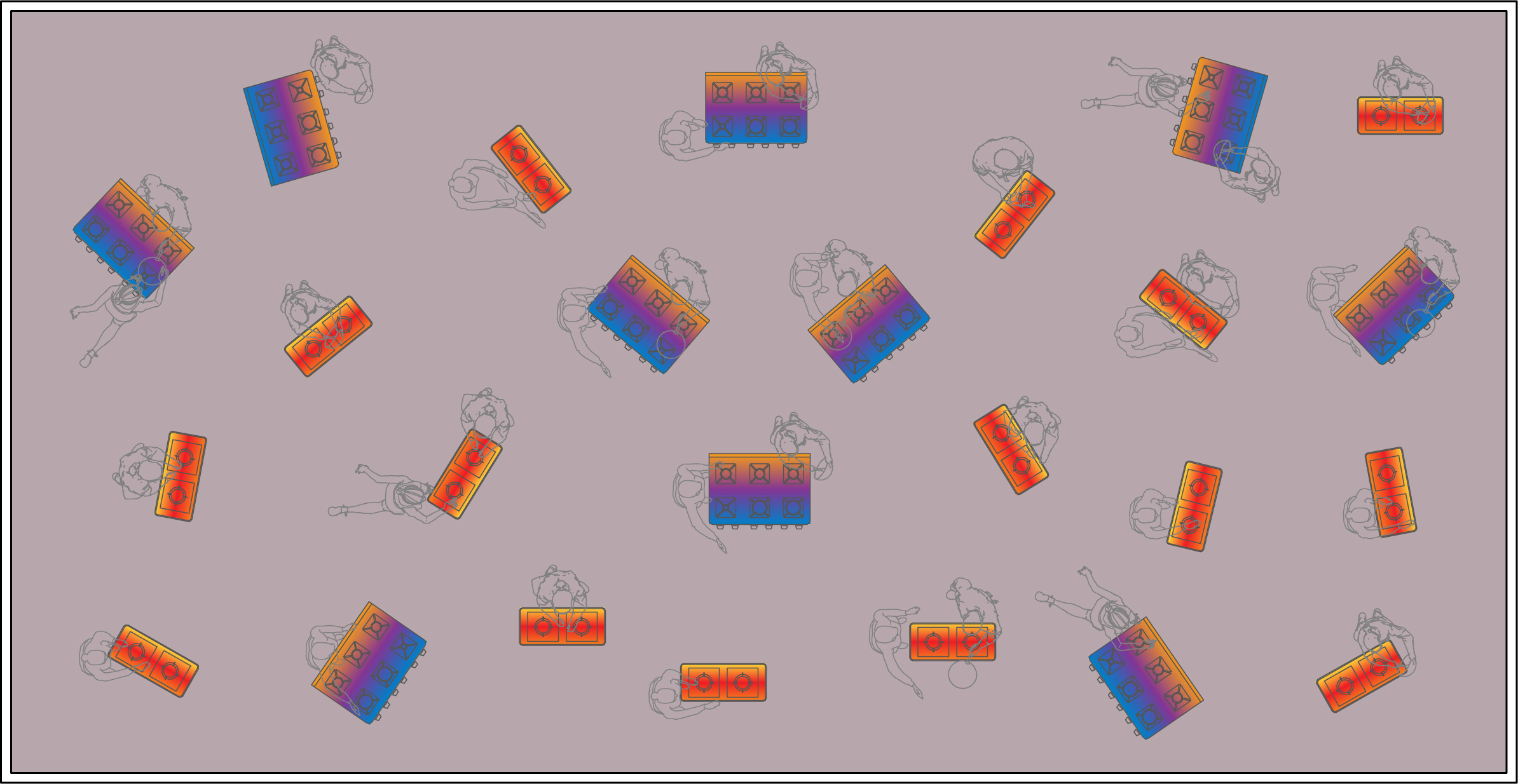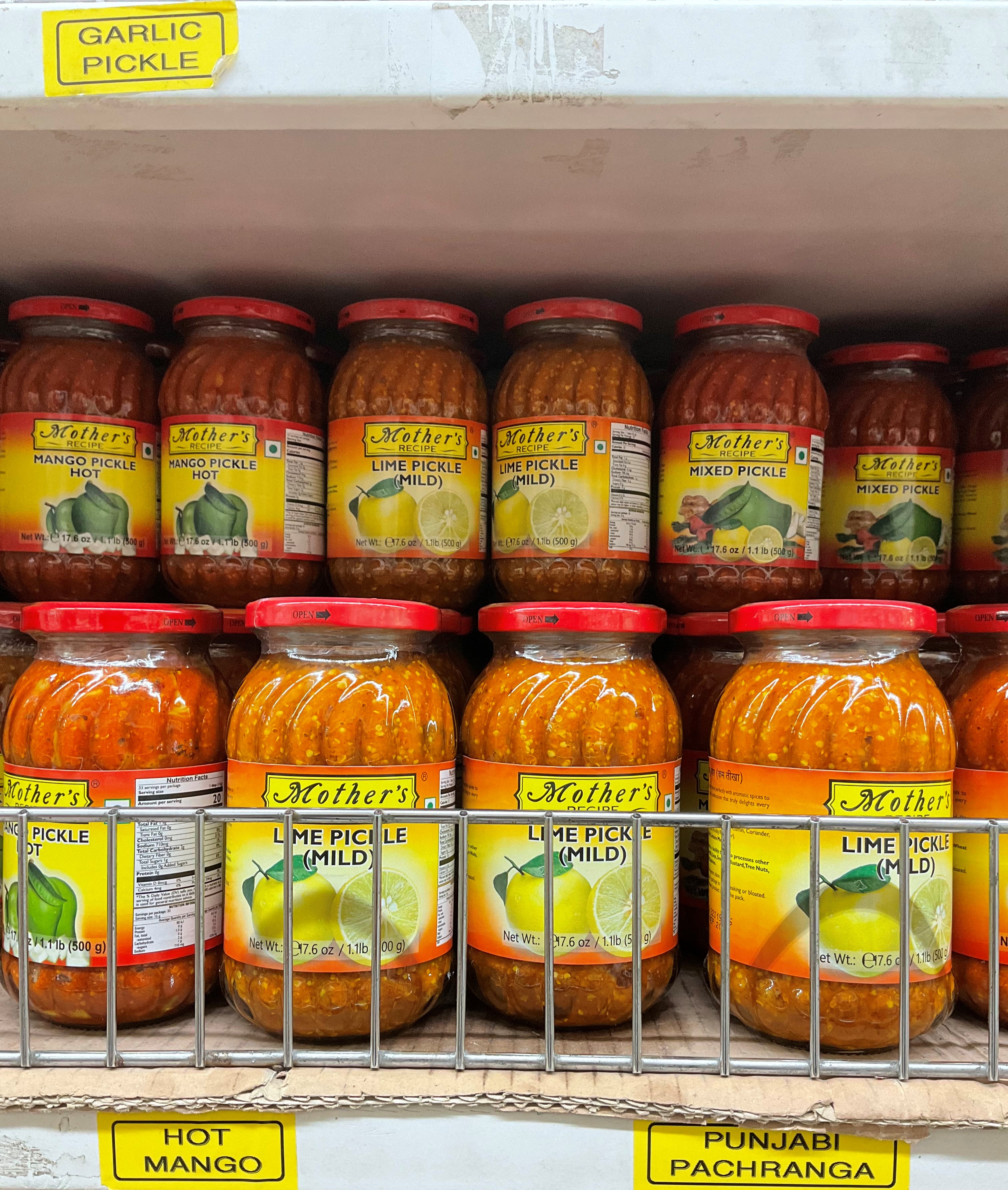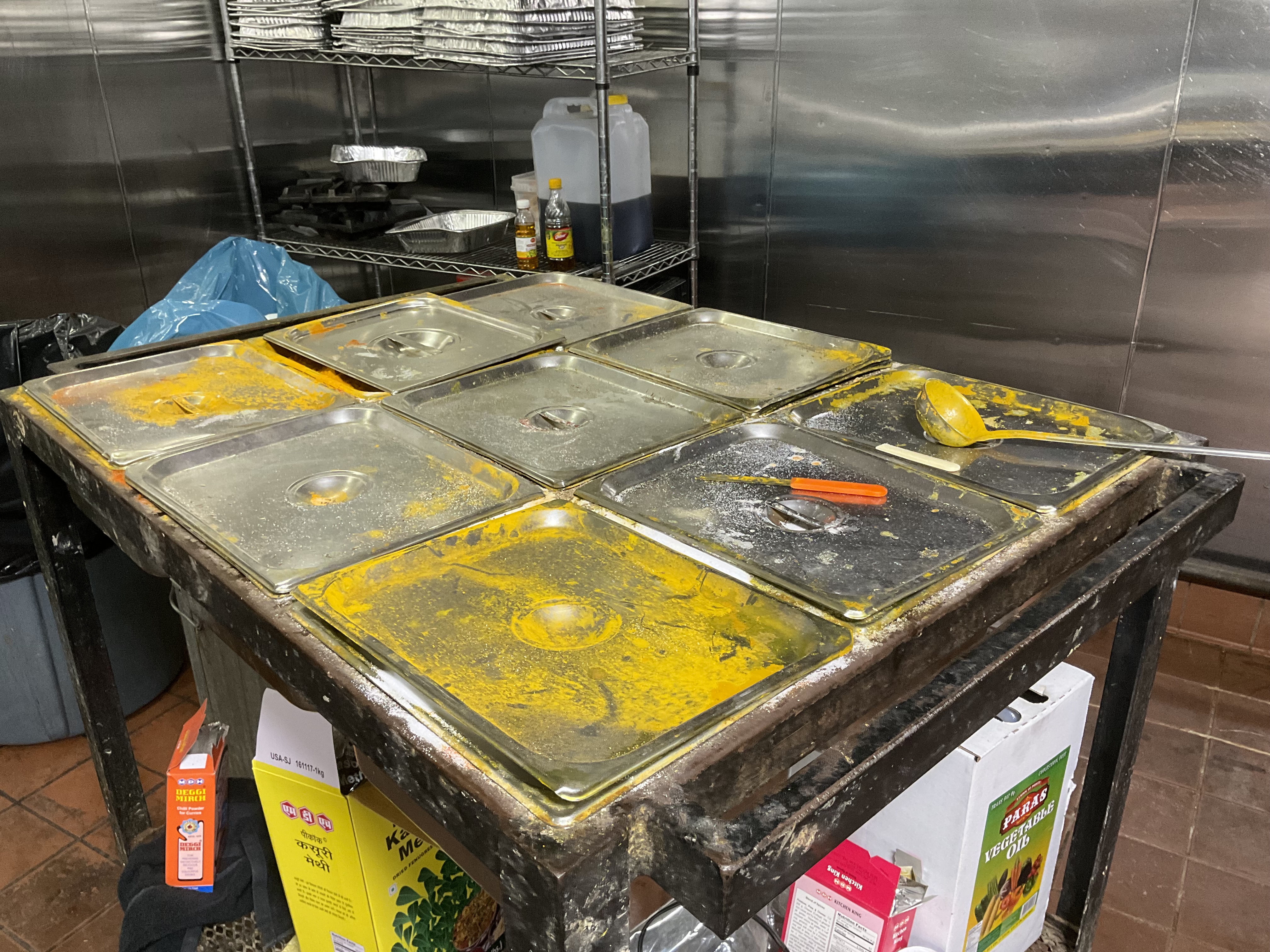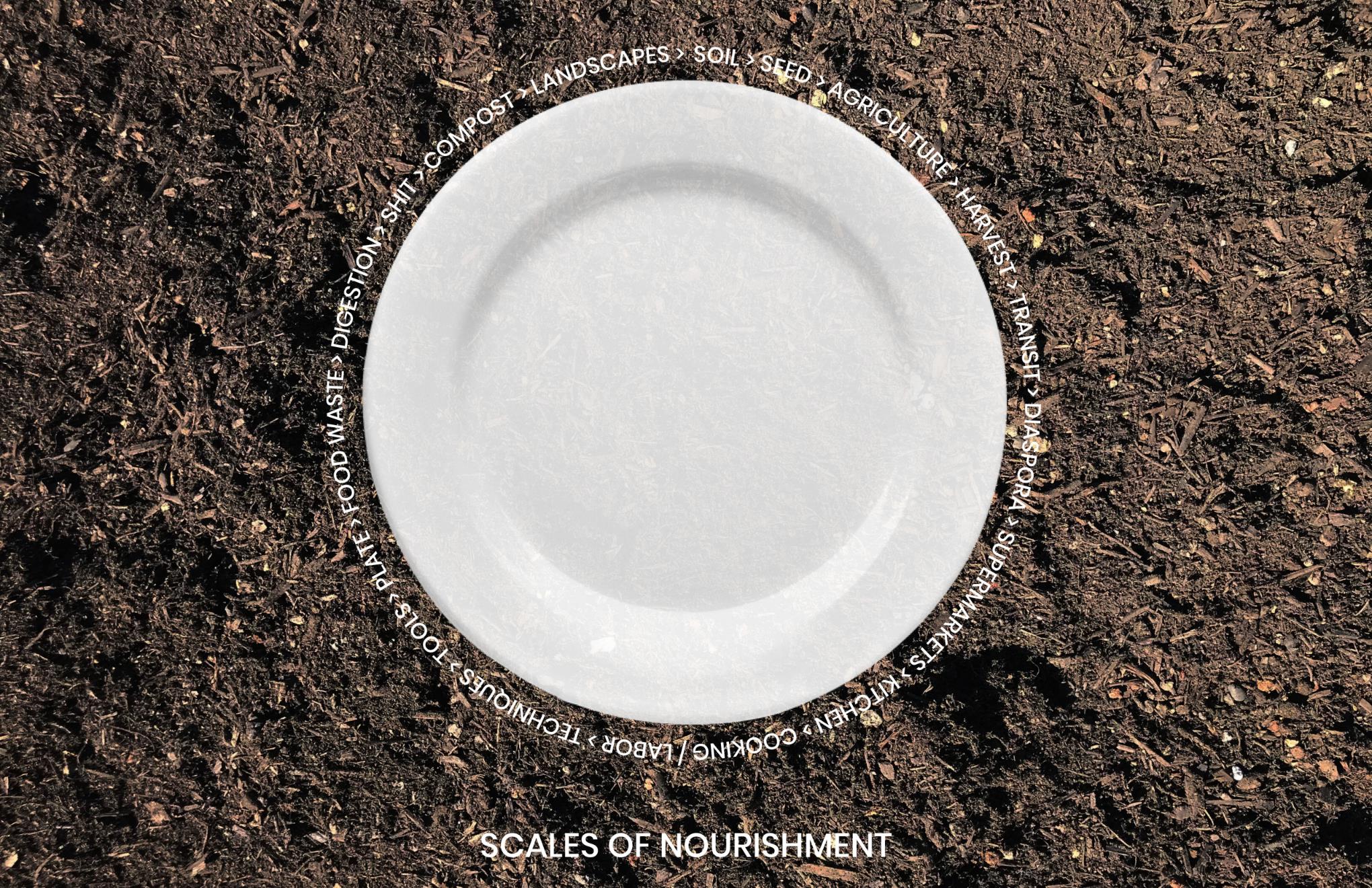Programming Collectivity with Public Kitchens
Author: Swati Jain
My mission is to sense sociocultural biases in our built environment through a transdisciplinary practice of documentation and rehearse sustainable design solutions for the future of our cities.
Visceral Foodscapes
Envisioning the kitchen as a genderless, undivided space, the 11 weeks of food performances would offer people agency by engaging with the materiality of food as a portal to building nourishing futures. Visceral foodscapes, when shared, lead to negotiations on taste preferences, smells, nutritional proportions, and enact different interpretations of ingredients among people from various backgrounds and cultures. This fosters a new understanding of their histories, flavors, and consumption practices, bridging food disparities and reinforcing horizontal food networks. It also introduces new avenues of care practices between communities. Food performances will also help us cultivate tools for shared cooking, laying the groundwork for research on collective kitchen prototypes.
Food performance
Food Performance and Research Schedule:
Week 1: Explore food species in different parts of the world (e.g., different species of chilies, tomatoes, etc.). Work phenomenologically with the materiality of vegetables, fruits, grains, seeds, and spices through the lenses of people from different communities.
Week 2: Explore multicultural ethnic markets in New York and the history of the trade of certain common ingredients.
Week 3: Conduct a sensorial food performance - a raw, creative, innate response to produce and appetite. Actively use taste, smell, sight, touch, and sounds while interacting with organic produce to recenter our phenomenological relationship to everyday ingredients, before they become part of the economic, political, cultural part of the ecosystem of procuring food and distribution of resources.
Week 4: Use taste, smell, sight, touch, and sounds engage in a phenomenological sensorium and raw interaction with food, exploring interpretation of grains and herbs through different senses. For example how flour is interpreted in various bread variations across cultures from bread to rotis to marraquetas.
Week 5: Guide heat and cold sources with local chef creatives and volunteers like Emma Leigh Macdonald, Søren Aagaard, Antto Melasniemi exploring different forms of heat. Invite food carts willing to assist individuals in processing food through techniques like baking, cooking, roasting, boiling, etc.
Week 6: Mix other miscellaneous things in food for taste (masalas), uncovering different spices and their cultural interpretations.
Week 7: Create new hybrid recipes; serve a wholesome meal (thali NYC) celebrate food and cultures.
Week 8: Build hybrid tools to serve common ground recipes; abstraction of tools as an extension of our hands working with different ingredients in a collective environment.
Week 9: Hold discussions around collective kitchens, food revolutions and other precedents around the world and in New York City.
Week 10: Interview scholars and researchers in food infrastructure, food research industries, architects, urban designers, collectives, etc., around foodscapes.
Week 11: Explore the kitchen as a caregiving, nourishing practice; a genderless symbiotic relationship with food. Document, exhibit, and present findings.
This research was developed in conversation with architectural scholars and researchers in 2022-2023 - Lydia Kallipoliti, Vyjayanthi Rao, Ben Goldner, co-founders of F-architecture Virginia Black and Rosana Elkhatib, Gabriela Aquije Zegarra and Maria A. Linares Trelles.
Swati Jain, "Kitchen Evolution," 2022 from The Kitchen on Vimeo
Millennium Film Workshop: Open Screenings is organized by Alison Burstein, Curator, The Kitchen and Joe Wakeman, Executive Director, Millennium Film Workshop.
https://thekitchen.org/on-screen/open-screenings/
My mission is to sense sociocultural biases in our built environment through a transdisciplinary practice of documentation and rehearse sustainable design solutions for the future of our cities.
Visceral Foodscapes
Envisioning the kitchen as a genderless, undivided space, the 11 weeks of food performances would offer people agency by engaging with the materiality of food as a portal to building nourishing futures. Visceral foodscapes, when shared, lead to negotiations on taste preferences, smells, nutritional proportions, and enact different interpretations of ingredients among people from various backgrounds and cultures. This fosters a new understanding of their histories, flavors, and consumption practices, bridging food disparities and reinforcing horizontal food networks. It also introduces new avenues of care practices between communities. Food performances will also help us cultivate tools for shared cooking, laying the groundwork for research on collective kitchen prototypes.
Food Performance and Research Schedule:
Week 1: Explore food species in different parts of the world (e.g., different species of chilies, tomatoes, etc.). Work phenomenologically with the materiality of vegetables, fruits, grains, seeds, and spices through the lenses of people from different communities.
Week 2: Explore multicultural ethnic markets in New York and the history of the trade of certain common ingredients.
Week 3: Conduct a sensorial food performance - a raw, creative, innate response to produce and appetite. Actively use taste, smell, sight, touch, and sounds while interacting with organic produce to recenter our phenomenological relationship to everyday ingredients, before they become part of the economic, political, cultural part of the ecosystem of procuring food and distribution of resources.
Week 4: Use taste, smell, sight, touch, and sounds engage in a phenomenological sensorium and raw interaction with food, exploring interpretation of grains and herbs through different senses. For example how flour is interpreted in various bread variations across cultures from bread to rotis to marraquetas.
Week 5: Guide heat and cold sources with local chef creatives and volunteers like Emma Leigh Macdonald, Søren Aagaard, Antto Melasniemi exploring different forms of heat. Invite food carts willing to assist individuals in processing food through techniques like baking, cooking, roasting, boiling, etc.
Week 6: Mix other miscellaneous things in food for taste (masalas), uncovering different spices and their cultural interpretations.
Week 7: Create new hybrid recipes; serve a wholesome meal (thali NYC) celebrate food and cultures.
Week 8: Build hybrid tools to serve common ground recipes; abstraction of tools as an extension of our hands working with different ingredients in a collective environment.
Week 9: Hold discussions around collective kitchens, food revolutions and other precedents around the world and in New York City.
Week 10: Interview scholars and researchers in food infrastructure, food research industries, architects, urban designers, collectives, etc., around foodscapes.
Week 11: Explore the kitchen as a caregiving, nourishing practice; a genderless symbiotic relationship with food. Document, exhibit, and present findings.
This research was developed in conversation with architectural scholars and researchers in 2022-2023 - Lydia Kallipoliti, Vyjayanthi Rao, Ben Goldner, co-founders of F-architecture Virginia Black and Rosana Elkhatib, Gabriela Aquije Zegarra and Maria A. Linares Trelles.
Swati Jain, "Kitchen Evolution," 2022 from The Kitchen on Vimeo
Millennium Film Workshop: Open Screenings is organized by Alison Burstein, Curator, The Kitchen and Joe Wakeman, Executive Director, Millennium Film Workshop.
https://thekitchen.org/on-screen/open-screenings/
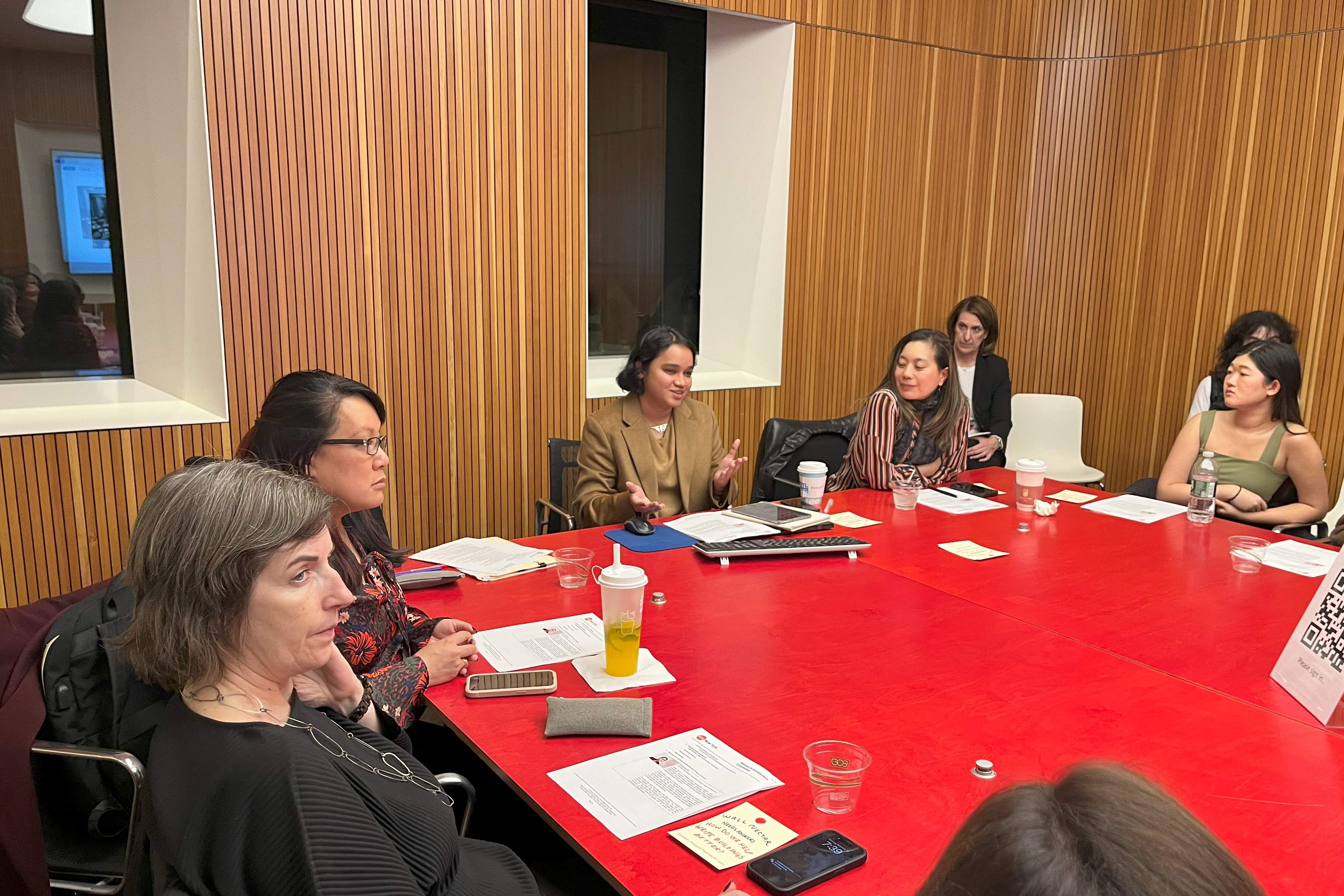
AIA WIA at the Centre for Architecture, New York, Nov 2023.
Envisioning kitchen as a genderless, undivided space. This presentation expanded upon Food performances that would offer people agency by working with the materiality of food as a portal to building nourishing futures. By going back to the body in space, unlearning and ungendering it. Visceral foodscapes when shared lead to negotiations on taste preferences, smells, nutritional proportions - these food performances would help us cultivate Tools for shared cooking between people from different backgrounds and cultures fostering a new understanding of their histories, flavors, and consumption practices. These tools enact different interpretations of ingredients (Eg. the way a particular herb is interpreted in Indian culture and western culture) This awareness bridges food disparities, reinforces our food networks to be horizontal and introduce new avenues of care practices between communities. Photographs by Vivian Lee
Panel discussion after the screening of Kitchen Evolution at The Tank, New York City, Nov 12th 2022.This conversation is joined by the writer/director of Kitchen Evolution, Swati Jain, and anthropologist, Vyjayanthi Rao, architectural researcher Ben Goldner, co-founders of F-architecture Virginia Black and Rosana Elkhatib. Moderated by architectural scholar Maria A. Linares Trelles.
Panel discussion after the screening of Kitchen Evolution at SAWCC (Asian American Writers’ Workshop) New York City, Oct 20th, 2022.This conversation is joined by the writer/director of Kitchen Evolution, Swati Jain, and architectural scholar, Lydia Kallipoliti, moderated by architectural designer Mai Abusalih.
Film screening of “Kitchen Evolution” hosted by Beyer Blinder Belle Architects and Planners on Jan 26th, 2023. Followed by a panel discussion with the writer/director Swati Jain, architectural scholar Lydia Kallipoliti, and architect and design researcher Gabriela Aquije Zegarra focusing on food systems and infrastructures in urban environments.
Design Brief - GenderLess X NewYork
This project aims to document the framework of multicultural food infrastructures and systems that exist in New York today and reimagines the integration of collective kitchens replacing the prevalent gendered private kitchen typologies in our houses.
Research Description
Half of the world's population constitutes women, and we still fail to address the issue of gender inequality. Recent data suggests, in the UK (2017) women per week spend 5 hours more time on household work than men.
Designing collective kitchens as a response to gendered labor structures and social inequality that domestic private kitchens position us in today. To achieve this, the study delves into both infrastructural and social organizational needs.
It aims to rehearse the housing typology by evolving kitchen appliances and tools to account for multiple users from different backgrounds, integrating collective non-gendered labor structures.
Social reconfiguration of housing corporations and tenant groups perhaps using media aid for scheduling routines and perishability of food. Reorganization of Food systems and distribution strategies to connect to these collective kitchens. Re-integration of urban farming (our relationship to seeds, soil, growth, and compost), resisting excessive urbanization.
Collective empathy towards food and ecologies requires communal care - cultural dynamics of inclusivity, sharing inter-generational recipes, establishing social bonds, and redefining family structures. Collective cooking encourages food innovation, energy conservation, and redirecting food leftovers to neighborhood community fridges combating inequalities/food scarcity and nourishing abundance in our urban environments and our planet.

Public Kitchens, Food performance
SCHEDULE
Phase 1 - Collective Food performances, cultural/social observations (Food+Design)
Phase 2 - Photographic documentation of Community Kitchens in the city (i.e Langar) (Media + Design)
Phase 3 - Speculative Design Production in the form of architecture, research films, redesigning cooking appliances/tool utensils for communal labor (based on ADA guidelines), and exhibition of data gathered.
Phase 4 - Presenting and discussing with scholars, Ph.D. candidates, and researchers in food systems and infrastructures, presenting different architectural configurations and feedback loops.
Phase 5 - Prototyping Kitchen Workshops
Phase 6 - Analsing, Writing, Editing, and publishing reports
Phase 7 - A working model of Collective Kitchen and presentations to City agencies
Phase 8 - Curation and Exhibition
Project Outcomes

The outcome of this project would be the Collective Kitchen Architecture.
By developing a deeper
understanding of the challenges and opportunities presented by the shift in architectural typology from
private to public kitchens.
Through engagement with design studios, city agencies, policy-makers, NGOs,
agricultural engineers, chefs, and local agents, the project would explore design possibilities for collective
food operations and create a network of resources to build a collective kitchen prototype as an
architectural typology.
The project would culminate into a Collective Kitchen Architecture
prototype.
along with an exhibition, panel discussions, text / book,
a public sculpture
and
food workshops to disseminate the idea and facilitate community building and food security.
RESEARCH AREAS
Mapping Care Work, Food Systems, and Assemblies, Cultural / Social / Economic factors, Logistical factors, Design tools and systems, Economic dependencies and women's rights, Social Justice Strategies, Institutionalization of food systems for schools, Cooking as a sensorial experience, Ethnic markets, Management / Operations, Urban farms, Collective menus, Plural domesticities; Genderless cities.
June 8, 2020, Pandemic. “This isn’t a soup kitchen or a food bank. It’s a gurdwara, the place of worship for Sikhs, members of the fifth-largest organized religion in the world, with about 25 million adherents. Providing for people in need is built into their faith. An essential part of Sikhism is langar, the practice of preparing and serving a free meal to promote the Sikh tenet of seva or selfless service. Anyone, Sikh or not, can visit a gurdwara and partake in langar, with the biggest ones — like the Golden Temple in Amritsar, India — serving more than 100,000 people every day.”. - The New York Times.
Just like the Restrooms are now described as neutral facilities, they have been contested spaces that are shaped by and in turn, shape the ways bodies and communities come together. With this evolution of the most private space where gender, religion, race, ability, hygiene, health, environmental concerns, and the economy are defined culturally defined its infrastructure, it’s time for our kitchens to take the centre stage to be collective spaces of equity. Similar to the evolution of the camera for the porn industry.
Restrooms, which were once gendered spaces, have undergone a transformation to become neutral facilities. However, they have been sites of conflict that reflect and impact the ways in which individuals and communities interact. The cultural, social, and economic factors that influence the design and use of restrooms are similarly relevant to kitchens. Therefore, it is time to shift the focus from kitchens as private spaces to communal areas that promote equity and inclusivity. By recognizing the diverse factors that shape kitchens, we can create equitable spaces that are welcoming and accessible to all, and that foster community-building and shared ownership.
![]()
Packaged Mango Pickle - Apna Baazar, QueensA mother’s care might escape rational measures of thought but maybe there is some advantage in measuring the immeasurable and putting it on a shared platform to bring back abundance.
RESEARCH AREAS
The process of design prototyping will allow us to de-center the private kitchen and re-center it to the city, and the community. Bringing in participation from everyone towards collective labor, collective care, and collective digestion. Breaking the 3rd wall of heteronormative gendered labor practices around the kitchen in domestic spaces.
The design of the collective kitchen distributes different resources - gas, water, soil, and fresh produce designed to be shared for sustainability.
Curbing the resultant emissions and resources used by individual kitchens across the housing horizon, with gendered labor practices leaving us with inherent inequalities towards women and other minorities in all walks of life.
Collective cooking infrastructures will strengthen our connections with our ecologies and give us agency over the way we organize and distribute our food and nourish ourselves with abundance while fulfilling our social needs of connecting with each other.
![]()
Punjabi Langar / Community kitchen Typology - Richmond Hill, Queens NYC
Cultural / Social Organization / Economic factors
Patriarchal Structures and economic dependencies and women rightsMapping Care WorkHabits of gendered inhabitance, Social practicesExisting / Historical religious/philanthropic food distribution case studiesInsecurities in PolicymakingSocial Justice Strategies. Failed Kitchen Infrastructure case studies.
![]()
Punjabi Langar / Community kitchen Typology - Richmond Hill, Queens NYC
Logistical factor
Estimation of people involved; providers and consumers.Cleanliness.Use of technology for scheduling collective cooking and take-outs.Cultural exchange / Melting potDevelopment of the food-making industry and chef/management jobs.Cultural innovation and resonance.
![]()
Microbial home, Philips
Design tools and systems
Spatial requirements and planningSense of belonging / Kitchen as a social needThe act of cooking as a sensorial experienceKitchen appliances redesign and researchPlacement and redesigning of various cooking appliances/tool utensils for communal laborScaling up and down of communal kitchens based on neighborhoods.
![]()
Financial factors
public/private/NGO/Govt agenciesValue system What helps this shift in kitchen typology continues/spread
![]()
Ethnic food vendors, Indian / Bangladeshi - Jackson heights, Queens NYC
Food system
Sourcing Ethnic neighborhood groceries DistributionStorage / Food guardianshipWaste Management / CompostCommunity fridge.
Collective Menu
Nutritional factor
Urban farms
Vegetable Garden part of the kitchenLandscape design of foodscapes in the citySoil and seed maintenanceCollective responsibility
Plural domesticities; Genderless cities
Redesigning of houses after the kitchen goes into the public realm.Future Co-literacy : Institutionalization of food systems from school; food science being tied with other disciplines. We could start by making a children's book format zine/publishing and distributing it in local schools.
![]()
Public Kitchen (Food) performance
South Asian context
![]()
India, with a population of 1.408 billion almost half of which are women participating in unpaid domestic labor practices which are engrained as a social responsibility. I want to not only question the social engineering that goes into maintaining these social contracts of unpaid care work but also the unsustainable internalization of kitchens within the domestic threshold. By internalizing it we are creating power dynamics that don’t hold up to the test of time and forces compromise, creating financial dependencies.
By making kitchens a collective effort we are not just making the care work visible but also repairing our relationship with the environment. We are not just un-gendering the space of the home but also inviting everyone to join the community of the Kitchen.
Institutionalization of Community kitchens not only brings the communities closer by building a world of equality but also sites innovation, multi-cultural exploration, community bonds, and friendship over food.

Houses of plurality,
Houses of equity,
Houses of nourishment,
Houses of community,
Culture as a living, breathing organism,
Always ready to change,
to transform.
Case Studies
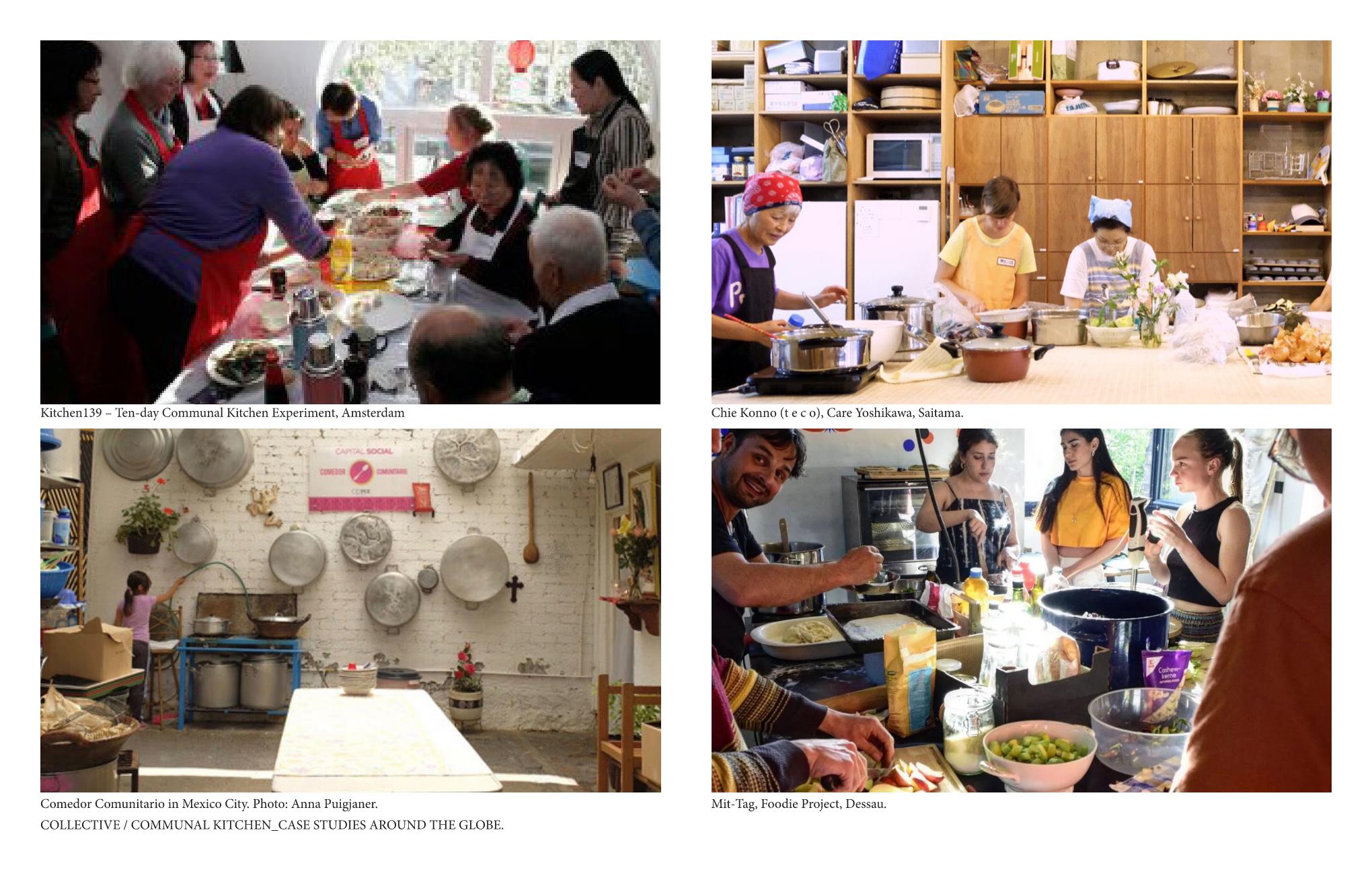

Bibliography
https://www.nytimes.com/2020/06/08/dining/free-food-sikh-gundwara-langar.htmlEmpathy Revisited: Designs for more than one, bookKitchenless City - Anna Puigjaner http://rebelkitchens.org/info.htmlhttps://www.conflictkitchen.org/The History of Sexuality, Michel FoucaultPoetics of Relation, Édouard GlissantStaying With the Trouble, Donna J. HarawayInvisible Women, Caroline Criado PerezThe theater of the Bauhaus, Oskar SchlemmerMythologies, Roland BarthesHaunted Bauhaus, Elizabeth OttoThe Architecture of Closed Worlds, Or, What is the Power of Shit?, Lydia KallipolitiAre We Human? Notes on an Archaeology of Design, Beatriz Colomina, and Mark Wigleyhttps://www.designboom.com/design/philips-eco-friendly-microbial-home/https://casco.art/activity/kitchen139-ten-day-communal-kitchen-experiment/https://www.e-flux.com/architecture/digestion/https://www.e-flux.com/architecture/digestion/487070/the-excremental-interior/https://www.e-flux.com/architecture/overgrowth/221624/bringing-the-kitchen-out-of-the-house/http://rebelkitchens.org/info.htmlhttps://rootsradicals.berlin/https://depatriarchisedesign.com/https://www.e-flux.com/architecture/critical-cooking-show/358117/cooking-with-stories/Martha Rosler, Semiotics of the KitchenPeter Cook Plug-in City Mega StructureRem Koolhas, Countryside, The FuturePipilotti Rist, Desiring Machine Parts of a Body House Book, Carolee Schneemann
Living Room, A.K. Burns https://biennalerestrooms.com/The-Restroom-Pavilionhttps://cofutures.org/

